American dictionary with translation into Russian. English in the US and UK. Differences in the meanings of words
“We share the same language with the British, we just use it differently.” This is how one casual acquaintance of an African American explained the essence of the issue to the author. Indeed, the differences between the American and British dialects, although noticeable, are not so important as to seriously bother with this issue. If your level of English is still far from ideal, then you should not spend more than ten minutes reading this article studying American-British differences.
Differences in pronunciation
It is in the accent that the greatest differences between British and American English appear. If, when reading a text, it is usually difficult to determine by whom it was written, then oral speech instantly gives out the nationality of a person. For more information about the features of American pronunciation and intonation, see the article on the American accent (we recommend reading, because knowing these nuances greatly facilitates listening comprehension).
In addition to accent differences, there are also differences in the pronunciation of certain words:
The word schedule in the British version begins with the sound sh, and in the American version, at the beginning of the word it sounds ck.
In the words either and neither, the first two letters can mean either a long sound i, or a diphthong ai. It is believed that the first option is more American, the second - more British. However, both of them can speak differently in different situations.
In many words of non-English origin (often names and titles), for example, Mafia, Natasha, the British pronounce the stressed sound like [æ], and the Americans like [a].
The word lieutenant in the British version sounds like l? f`t? n? nt, and in the American it is lu`t? n? nt
There are a lot of similar words, but most of them are of little use (which is why the differences did not have time to smooth out). For those who are interested, there are many examples on Wikipedia - American and British English pronunciation differences.
Differences in word formation
The suffix "-ward(s)" is usually used in the British dialect as "-wards" , and in the American dialect as "-ward" . We are talking about the words forwards, towards, rightwards, etc. However, the word forward is also actively used in Britain, and the words afterwards, towards, forwards are not unusual for the American dialect either.
For American English, word formation through word formation is more characteristic. Today, most often it is in the Western Hemisphere that set phrases turn into new words. When forming phrases consisting of a noun-subject and a verb that speaks of its purpose, in the British version the gerund is more often used ( sailing boat), and the Americans prefer to simply glue the verb with the noun ( sailboat).
The same is with phrases meaning an object and its owner - dollhouse vs. doll "s house. It is clear which option is American and which is British.
spelling differences
Words ending in British in -our, the Americans shortened a little, and they end in -or: labor, color, favor instead of labor, color, favour.
British words apologise, paralyse in American are written as apologize, paralyze.
Some words of French origin ending in -re end in -er in the American version: center, theater instead of centre, theater.
The word "gray" in British spelling looks like gray, and in American it looks like gray.
Differences in the meanings of words
Often, Americans and British people use different words for the same concepts. For example, an American will call a toilet not toilet, but exclusively bathroom, even if there is no bath or shower and close. The point (the one that is placed at the end of the sentence) in British will be full spot, and in American it will be period.
Here is a table of the most common differences. Source - M. S. Evdokimov, G. M. Shleev - "A Brief Guide to American-British Correspondences."
American variant |
Translation into Russian |
British variant |
| first floor | ground floor | |
second floor |
||
government |
||
apartment |
||
homework |
||
auditorium |
||
banknote |
||
billion |
||
sad |
||
tin |
||
wardrobe |
||
corn |
||
apothecary |
||
repair |
||
guarantee |
||
Intersection, junction |
crossroads |
|
lend |
||
located |
||
magician |
||
tube/underground |
||
cinema |
||
napkin |
||
oatmeal |
||
package, package |
||
pantry |
||
pavement |
||
chairman |
||
control, test |
||
to order |
||
timetable |
||
sewer |
||
injection |
||
label |
||
truck |
||
two weeks |
||
underground pass |
||
holiday |
||
telegram |
||
wrench |
||
| postcode |
Sometimes the differences are more subtle. In American English, quite has a connotation of amplification, and can more often be translated as "quite" or even "very". In British it should rather be understood as "to some extent".
Differences in grammar
This section was written using information from the article American and British English differences
In American English, nouns denoting a group of people (army, government, committee, team, band) are usually singular. The British, on the other hand, can use these words both in the singular and in the plural, depending on whether they want to emphasize the multitude of people or their unity. If the name of the collective is plural, then in any case the plural should be used. The Beatles are a well-known band.
There is a difference in the use of irregular verbs in the UK and the US. So, the verbs learn , spoil , spell , dream , smell , spill , burn , leap and some others in the British version can be both regular and irregular, having the endings ed or t, respectively. In America, irregular forms are used much less frequently, other than burnt and leapt. The verb spit in British English has the form spat, and in American it can be both spat and spit, the former being more often used figuratively in the sense of "spit out" (a phrase) or "spit out some object", rather than saliva. The past participle of saw is sawn in British and sawed in American. In America, the past participle of the word get can take the form gotten, from forget - forgotten, and from prove - proven. There are other differences in the use of irregular verbs, mainly related to local dialects, and this issue can be studied for quite some time.
The British often use the past perfect tense (I have just arrived home), and the Americans prefer the simple (I just arrived home), especially in phrases with the words already, just, yet.
In the British version, the forms "I have got" (possession) and "I have got to" (necessity) are used more often in colloquial speech, and the expressions "I have" and "I have to" sound more formal. In America, "I have" and "I have to" are most often used, and in informal communication, you can use "I got" and "I got to", respectively. The last expression is known to have recently mutated into "I gotta".
Americans in oral speech can build conditional sentences as follows: "If you" d leave now, you "d be on time." The literary analogue would sound like "If you left now you'd be on time." In a letter, even the Americans try not to use the first option.
In the subjunctive mood for America, constructions of the form "They suggested that he apply for the job", and for British - "They suggested that he should apply for the job".
The auxiliary verb shall is almost never used in the US.
Which option is better?
There are opposing opinions about which version of the language to focus on when learning English. Supporters of the American version talk about its wider distribution, modernity, simplicity and convenience. They are right. Their opponents believe that only the British version is real English, and everything else is a simplification, clogging and perversion. They are right too. The correct answer is to learn both in order to understand everyone. If we talk about grammar, then most textbooks give the classic British version. American colloquial norms, although simplifying British ones, do not cancel them. Do not be afraid to overwork, study English grammar. If your phrase is too literary, then no one will think badly of you. Worse, if you, on the contrary, try to simplify what should not be simplified, you will look like a jamshut. As for vocabulary, first of all, you should know the American meanings of words, because they are used almost all over the world, except for Britain. Thanks to Photoshop, the whole world (and the British too, by the way!) knows that an eraser is an eraser , not a rubber , and thanks to Eminem, the world remembers that a closet is a closet , not a wardrobe . (However, you should know when to stop - you should not call football "soccer" anywhere except America).
: what should be remembered? The United States and Great Britain use English as their primary and state language, but it is always worth remembering that these are two different versions of English. It is likely that over time, American English will take over more territory as Americanization is in full swing, especially in Asia. In addition, there is a large proportion of the English-speaking audience on the Internet, and there English is really Americanized. And my own belief is that sooner rather than later, American English will replace all forms of communication, be it the Internet, the media, or literature. Since the division of this language is now due to differences in spelling, vocabulary and expressions, when translating from British English to American, and vice versa, you must take these differences into account. This is especially true for those who provide professional services of English translators. They have to constantly check with British and American English dictionaries to avoid inaccuracies in their work. Although the biggest difficulty lies precisely in the style of the language. Since British English is basic and “correct”, while American English is looser and “wrong”, the difficulties in translation begin precisely with the style. Spellings such as "can't," "don't," are completely unacceptable in British English for public print and advertising, and are acceptable to Americans. There are grammatical differences in how the English and Americans construct their sentences. However, more and more linguists agree that the future belongs to “Universal English” or “International English”, something that will be acceptable and understood all over the world.
In any case, take note of the following tips:
- If you are using a text editor, change the language setting in the spell checker from English (UK) to English (USA). If you enter a misspelled word, it will be underlined with a red line. Right click on a word to get the correct spellings.
- Note the use of different ways of writing dates and times. Time in the UK is given in a 24-hour format, while in the US a 12-hour clock is used. So 6:00 p.m. is 6 pm in the US, and 6 pm in the British system.
- There are also differences in the use of punctuation marks.
- The use of different words to refer to the same subject. You may not remember all the options, and often in speech one is replaced by another, this is not counting the differences in the spelling of the same word. You can see more detailed examples in the table below (click on the image to open the table in full size):


 |
The British and Americans speak the same language but use it differently. Indeed, sometimes there may be misunderstandings between them, but this is not at all a reason to believe that British and American versions of English are so different that the British absolutely do not understand Americans. In fact, American English has far surpassed its original source in terms of prevalence. It is strikingly different from the classic British version, but not so much as to become a completely new language. However, differences can be found in all aspects: grammar, pronunciation, vocabulary.
- Read more about the differences in grammar in our article "".
- I also recommend an article about pronunciation in different versions of English "".
Well, in this article I would like to focus on the lexical differences between American and British English. Let's finally understand the use of words, so as not to get into trouble and avoid misunderstandings in English-speaking countries. So, let's begin!
Often you will come across words that are spelled exactly the same but have different meanings in America and the United Kingdom. For example, in the UK, if you need to use an underground mode of transport, and you ask a passer-by: “ Could you tell me the way to the nearest subway station?” (Can you tell me how to get to the nearest metro station?), your chances of getting into the underground are zero, since the British under the word subway include only an underpass. And here is their subway underground.
And how many servings of chips were eaten by the British in America when they just wanted to order some crispy potatoes like the one you can taste at McDonald's! Chips from the British - crisps, and under the word chips they mean french fries. In America, the opposite is true: chips- chips, fried potatoes - french fries.
Sometimes these differences can lead to funny situations. Let's imagine for a second a dialogue between two people, one of whom (an American) says:
“Oh no! I got a flat!” His friend from Britain will obviously not understand the tragedy in the voice of his interlocutor, because in his understanding this phrase means “Oh no! I bought an apartment!” While the bad news came from the lips of an American that he had punctured a wheel, since flat = flat tires- punctured wheel, flat tire.
And what a shock the sign on the road will plunge the Englishman Don't step on the pavement if he meets him in America. After all, in the UK pavement- sidewalk, and in the USA this word has the opposite meaning - pavement, road, carriageway.
 Let's say you decide to compliment a well-looking and visibly built colleague from London. You unobtrusively noted: You look great! Nice pants!” You are incredibly lucky if your acquaintance is shy and modest. In this case, a slight blush will appear on her cheeks, and she will hasten to disappear from sight. But if timidity and shyness are not her qualities, then you have every chance of getting a slap in the face, because in the British version pants- underwear, while in America it's just trousers.
Let's say you decide to compliment a well-looking and visibly built colleague from London. You unobtrusively noted: You look great! Nice pants!” You are incredibly lucky if your acquaintance is shy and modest. In this case, a slight blush will appear on her cheeks, and she will hasten to disappear from sight. But if timidity and shyness are not her qualities, then you have every chance of getting a slap in the face, because in the British version pants- underwear, while in America it's just trousers.
A few serious things. For example, for verbs to hire and to rent main meaning - to pay for the use of something. In Britain, the verb to rent used mainly when talking about long leases ( to rent a house/flat/room). To hire used when talking about a short-term lease ( to hire a bicycle/car/dress), although recently in Britain the expression is increasingly used to rent a car. In America, there is no such difference. For any type of lease, the word is used to rent. To hire is of primary importance to give a job to smb.
Speaking of distance, in Britain we use the words farther and further when we want to say that something is further away than another object. These two words are used interchangeably. But in America they only use the word farther.
(BrE) London is further/farther than Glasgow. London is further than Glasgow.
(AmE) New York is farther than Texas. New York is further than Texas.
Separately, I would like to note the names of the floors in the British and American versions.
| Floor number | british english | american english |
|---|---|---|
| 1st floor | Ground | First |
| 2nd floor | First | Second |
| 3rd floor | Second | Third |
And now I suggest you watch the video and memorize the words related to food. Many names of vegetables and dishes are different in British and American English. These differences are important to remember in order to know what you are ordering at a restaurant.
As we noted earlier, Americans do not like complexity and three-story structures. This is especially noticeable when they talk about time. half past six for 6:30 - not at all for them, six thirty– simple, clear and logical. Why not!
| british english | american english | Translation |
|---|---|---|
| At half past six | At six thirty | At 6:30 |
| mum | Mom | Mum |
| Sweets | Candy | Candy |
| biscuit | cookie | Cookies |
| Flat | Apartment | Apartment |
| Postman | Mailman | Postman |
| post | ||
| post box | Mailbox | Mailbox |
| holiday | Vacation | Holidays |
| Form | grade | Class |
You can see some other differences in the illustration.

And finally, I would like to give advice to learners of English. Indeed, there are certain differences between the American and British variations of the language. Opinions differ as to which option to choose for study. Someone insists on the American one, arguing their choice with its simplicity, wide distribution and modernity. In response, proponents of British English accuse them of being inaccurate and dismissive in their use of the language. Each of them is right in its own way. But it is logical to learn both options in order to understand everyone and be able to adapt to any environment, wherever you find yourself. If your speech seems too literary and British to someone, no one will reproach you. And if you oversimplify your statements (supposedly in an American manner), there is every chance of appearing illiterate. Learn both versions of English, memorize all lexical differences, remember about grammatical simplifications, write correctly, and stick to one version in conversation.
Let's now check what you managed to remember in 10 minutes of reading this article.
Test
British vs American English: Vocabulary practice
“Which version of English is better to learn: British or American?” students often ask.
Is this question correct? Are these really two very different versions of the language? For example, Lynn Murphy (Associate Professor of Linguistics at the University of Sussex in the UK) believes that it will be more difficult for a Londoner to understand a Scot than a native of New York.
In addition, both the USA and the UK have a huge number of their own accents and dialects. Therefore, the concepts of “British English” and “American English” are rather general categories that combine all these varieties of language.
True, there are still some general differences: in grammar, vocabulary and pronunciation (probably to the smallest extent, because the accent will depend on the specific region of the speaker's residence).
So, I propose to discuss these three aspects, but the main focus is still on vocabulary, since this is the most useful topic for us.
To make it more interesting for us, we will find specific examples from films and TV shows, as well as watch cool videos.
At the level of grammar: about American simplifications
Here are a few notable differences:
1. American English strives for simplification, so in some cases the tenses of the “group” Perfect can be replaced by Simple.

Past Simple is used, while Present Perfect should be used with just.
2. Collective nouns (nouns denoting a group of persons - team, army, Government etc.) in BrE can be both in the singular (when the group is meant as a whole) and in the plural (when the group is the totality of its members). In AmE, such nouns usually agree in the singular.

The word government agrees with the verb thinks (third person, singular), while, for example, in the British civil service, the term the Government always agrees in the plural in order to fulfill the principle of ministerial collective responsibility.
3. The first and second forms of the past tense of verbs learn, spoil, spell, burn, spill, leap etc. can be both correct (burned, leaped), and wrong (burnt, leapt).
In BrE, both forms are used equally (while the incorrect form is more common, especially among carriers of Received Pronunciation).
In AmE, the irregular forms of these verbs are almost never used.

A line from the song "Try" by American singer Pink
About pronunciation: is it easy to portray an American accent
Vowel sounds:
- in words like student, new, duty Americans have virtually no sound [j] so these words sound like , , [`d u:ti] (not “st yo dent”, a “st at dent”);
- Instead of a vowel [a:] in words like class, plant, answer pronounced sound [ æ ] ;
- In an unstressed position, many vowels turn into a sound "schwa" or almost disappear: from may sound like “frm”, are may sound like “er”(that's why American speech is often called "chewed", illegible).
American actors speak with a British accent
Consonants:
– In American English [r] at the end is almost always pronounced (unlike the classic British pronunciation).
- With descending intonation, the sound [t] between vowels becomes [d](similar to short Russian [ R ]).

Remember how the lead singer of the Red Hot Chili Peppers said the phrase of the song “Give it away” (sounds like “give itR
avey”). Another example is Little Richard's song "Tutti Frutti" (pronounced "tuR
and fruR
and")
– Sounds [t] and [d] may be barely audible and unintelligible after the sound [n] in words like twenty(sounds like “Your nor” , “free ns” ).
This is where I propose to end the conversation about pronunciation, since it is not entirely correct to compare it, because there is no single pronunciation option in the UK and the USA, and each of the accents has its own characteristics.
British actors now speak with American accents
Vocabulary: what words an American won't understand
The most revealing layer of differences is still vocabulary. You can’t argue here: Americans call cookies cookie and the British "biscuit". Let's find examples of the use of different words in TV shows.
The American series "Friends" and the British "Sherlock" (word "apartment")

apartment

Apartment - flat
Another example: the American series “The Big Bang Theory” and again the British “Sherlock” (the word "elevator").

Elevator

lift
By the way, it turns out that the British "Harry Potter" was even translated into "American English" because of the large number of such inconsistencies. Here are some words that have been replaced: 
So, I propose to recall the words that differ in British and American English.
⠀
⠀BrE |
⠀AmE |
⠀Translation into Russian⠀ |
| ground floor | ⠀1st floor | ⠀ first floor |
| ⠀1st floor | ⠀2nd floor | ⠀second floor |
| Flat | Apartment | ⠀apartment |
| ⠀starter | ⠀appetizer | ⠀snack |
| homework | ⠀assignment | ⠀ homework |
| assembly hall | ⠀auditorium | ⠀ assembly hall |
| luggage | ⠀baggage | ⠀luggage |
| ⠀cellar | Basement | ⠀basement |
| ⠀banknote | Bill | ⠀banknote |
| ⠀billion | ⠀billion | ⠀billion |
| Sad | blue | ⠀sad |
| ⠀tin | can | ⠀ tin can |
| ⠀draughts | ⠀checkers | ⠀checkers |
| ⠀course | class | ⠀ course of study |
| ⠀wardrobe | ⠀closet | ⠀ wardrobe |
| ⠀biscuit | ⠀cookies | ⠀cookies |
| size | Corn | ⠀ corn |
| sofa | couch | ⠀ sofa |
| chemist | ⠀druggist | ⠀pharmacist |
| ⠀lift | elevator | ⠀lift |
| ⠀autumn | fall | ⠀autumn |
| ⠀repair | ⠀fix | ⠀repair |
| ⠀motorway | ⠀freeway | ⠀highway |
| ⠀match | ⠀game | ⠀match |
| Petrol | gasoline | ⠀ gasoline |
| ⠀mark | ⠀grade | ⠀ mark |
| ⠀ensure | ⠀Insure | ⠀ guarantee |
| ⠀cross-roads | ⠀Intersection, junction⠀ | ⠀crossroads |
| ⠀paraffin | Kerosene | kerosene |
| surname | ⠀last name | surname |
| ⠀queue | Line | ⠀queue |
| ⠀land | Loan | ⠀ to lend |
| ⠀situated | ⠀located | ⠀located |
| conjurer | magician | ⠀ magician |
| ⠀post | ||
| ⠀tube/underground | metro/subway | ⠀metro |
| cinema | ⠀movies | ⠀cinema |
| Serviette | napkin | ⠀napkin |
| porridge | ⠀oatmeal | ⠀ oatmeal porridge |
| ⠀parcel | ⠀package | ⠀ package, parcel |
| ⠀larder | pantry | pantry |
| Trousers | Pants | ⠀ trousers |
| white wax | ⠀paraffin | ⠀paraffin |
| ⠀road | Pavement | ⠀ pavement |
| Billiards | ⠀pool | ⠀ billiards |
| ⠀chairman | President | ⠀Chairman |
| test, exam | Quiz | ⠀ control, test |
| sultana | Raisin | ⠀ raisins |
| ⠀book | ⠀reserve | ⠀ order |
| ⠀timetable | ⠀schedule | ⠀schedule |
| ⠀drain | ⠀sewer/soil pipe | sewer pipe |
| ⠀store | Shop | ⠀shop |
| Briefs | ⠀shorts | ⠀shorts |
| ⠀jab | ⠀shot | ⠀ injection |
| Pavement | sidewalk | ⠀sidewalk |
| football | soccer | ⠀football |
| Tram | ⠀streetcar | ⠀tram |
| ⠀label | ⠀tag | ⠀label |
| Rates | Taxes | ⠀taxes |
| ⠀essay/project | ⠀term paper | ⠀course work |
| lorry | truck | ⠀truck |
| Fortnight | ⠀two weeks | ⠀two weeks |
| Subway | ⠀underpass | ⠀ underpass |
| ⠀holiday | Vacation | ⠀holidays |
| ⠀hoover | ⠀vacuum cleaner | ⠀vacuum cleaner |
| ⠀quay | ⠀wharf | pier |
| Telegram | wire | ⠀telegram |
| spanner | Wrench | ⠀wrench |
| zed | zee | ⠀letter Z |
| ⠀postal code | zip code | ⠀postal code |
 UCBrowser for PC is a worthy competitor for Google Chrome or not Uc browser fast mode
UCBrowser for PC is a worthy competitor for Google Chrome or not Uc browser fast mode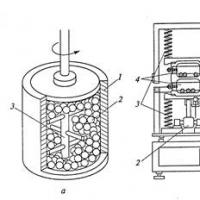 Basic technologies for obtaining nanomaterials
Basic technologies for obtaining nanomaterials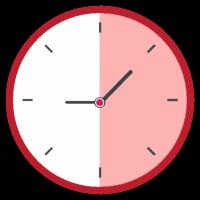 How to tell the time in English?
How to tell the time in English?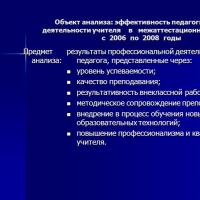 Presentation of the analytical report of the history teacher Participation in expert commissions
Presentation of the analytical report of the history teacher Participation in expert commissions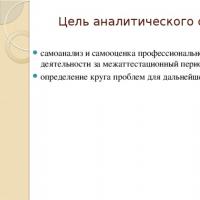 Presentation of the analytical report of the history teacher
Presentation of the analytical report of the history teacher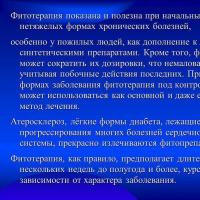 Presentation on the topic "atherosclerosis"
Presentation on the topic "atherosclerosis"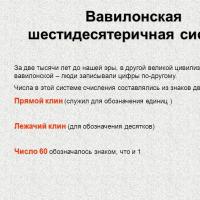 History of number systems
History of number systems